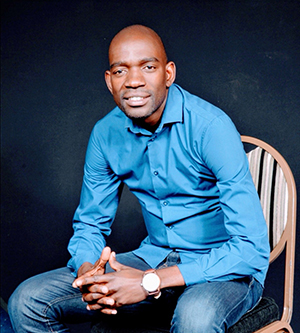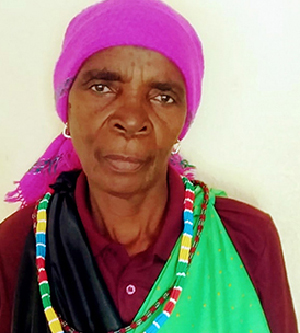
Equipped with state-of-the-art laboratories that provide students with hands-on experiences to bridge theory and practice

Dr Mdungazi Knox Maluleke, College of Agriculture and Environmental Sciences, Unisa
After completing his Grade 12 studies, a young man from Giyani, Limpopo, had to stay home for five years because he could not afford to pay the registration fees for tertiary education. He remembers how painful it was for him to see former classmates attend university. All he could do was to hope that one day his turn would come. Only after his mother secured work as a cleaner and managed to save enough money, was he able to pay his registration fees, and the rest, as they say, is history.
Fast forward to 2021, and that young man, who has always had an intense love for plants and agriculture, has now obtained a PhD in Agriculture (Plant Sciences) at the University of South Africa (Unisa). Meet Dr Mdungazi Knox Maluleke, a lecturer at Unisa, who wants to share his story of determination and perseverance in the hope that it will encourage young people of limited means to continue striving for their goals and dreams.
After beginning his studies at Baleni Primary School, he attended Mukula High School in Shawela Village, Block 23. The 36-year-old lecturer in the fields of plant studies and greenhouse crop production says he developed an interest in plants and agriculture when he used to accompany his grandmother, Makhanani Nwa-Mthechwani Maluleke, to her farm on weekends. "I adored my grandmother and loved spending weekends with her on the farm," he says.
Maluleke recalls how he could only register to further his studies after his mother, Khubani Taynah Rikhotso, found work as a cleaner at the Masingita Shopping Centre Complex in Giyani and was able to save for the registration fees. Once he was able to, he enrolled at the Tshwane University of Technology (TUT) for a National Diploma in Horticulture, which he achieved in record time and with distinctions in a few of his subjects.
He subsequently continued his education by enrolling at TUT for a BTech degree in Horticulture, which he achieved in record time. In 2013, he was appointed as a junior lecturer at Unisa’s College of Agriculture and Environmental Sciences. He then enrolled at Unisa for an MSc in Horticulture, which he finished in just over two years. The next step was for him to obtain his PhD, which he did in June 2021.

Dr Maluleke shared this photo of his mother, Khubani Taynah Rikhotso
"Life was difficult during my first year at TUT, but I am thankful to God and my mother, who continued to support me with the little money she had," says Maluleke. "This was difficult for her because she also had to care for my siblings." Maluleke says this is when he looked for part-time work and found a job at Ghekko Stocktaking. He considers himself lucky to have been hired as a student assistant in TUT’s Department of Horticulture during his second year of studies. Part of his responsibilities included assisting lecturers with administrative tasks and mentoring first-year students in order to raise the pass rate.
During his undergraduate studies at TUT, Maluleke missed an entire semester due to surgery, but did not allow the setback to stop him from achieving his objectives. "When God gives you an assignment, he has already put resources and people in place to assist you in completing it," he says. "When things don't go as planned, it's easy to become discouraged, but one must remember that God never fails."
He adds that working and studying simultaneously was challenging, therefore he devised a technique to continue to achieve academically. "I would ensure that I was in bed early every night, before 10 pm, and wake up at 1 am in order to study and maintain my academic performance," he says. "This technique worked so well for me that my results improved. For my postgraduate qualifications (BTech, master’s and PhD), I followed the same technique, which paid off handsomely."
Reflecting on his master’s and PhD journey, Maluleke says it was difficult because he had to juggle employment and studies, but he persevered. "My endurance was made possible by the obstacles I faced growing up," he says.
Maluleke says that for the past five years, he has followed a similar strategy to that which employed during his undergraduate studies - going to bed early after work and waking up in the wee hours to study.
Touching briefly on his academic interests, Maluleke says his research focuses specifically on plant sciences, the production of crops for food and medicinal purposes, and the commercialisation of indigenous crops. His PhD research investigated the performance and quality of C. metuliferus L (the African horned cucumber) grown under different environment for potential commercialisation. His research study focused on germination, water use efficiency, nutritional concentration and molecular biology (metabolomics).
He describes being a lecturer at Unisa as one of his life's finest achievements, which he will always treasure. "I was young when I started this profession," he says. "I was at first scared by the fact that the most of my co-workers were already doctors and professors. I chose to use that as motivation to work hard and achieve that goal. I am so glad to have met Prof SJ Moja and Dr EM van Staden. They have had a significant part in my career and pushed me to work hard to achieve my objectives."
Maluleke adds that his exposure and experience taught him a few things, including that hard effort pays off, and that where there is a will, there is a way. "It has taught me to always be sympathetic, especially when working with students, because most of them share my experience," he says. "I constantly try to put myself in their shoes and go above and beyond to help them realise their ambitions as much as possible. The majority of Unisa students are either employed or come from a low-income family, which is a setting that I am quite familiar with."
Maluleke says that he understands how challenging it is to strike a balance between employment and school, and that he usually advises students to make a study schedule, stick to it, and get as much rest as possible because academic success is entirely dependent on mental and physical strength. "I also advise postgraduate students to write one or two paragraphs every day at the very least," he says, "as this will help them stay current with their studies. It is also critical to maintain continual touch with your supervisor so that he or she can assist you in moving in the appropriate direction."
According to Maluleke, universities play a critical role in South Africa's National Development Plan and the continent's development by making higher education accessible to students from all backgrounds and situations, and increasing the number of master’s and doctoral degrees obtained. This is why he is passionate about the work he does at Unisa. "Unisa allows students from many backgrounds to continue their studies, and this support is critical to student success," he says. "I consider myself extremely fortunate to have studied and currently work at this university, which instilled in me a wide range of life values."
He concludes the interview by stating that not everyone is born with material and educational privileges – some people, such as himself, have had to work very hard and make sacrifices to attain these things. Quoting his late grandmother, Mphemphu Nwa-Hlava Rikhotso, he says: "All you have to do is work hard, pray and retain the faith, and God will one day answer your prayers. That piece of wisdom is still fresh in my mind."
Maluleke’s counsel to students is to respect their career, protect it and honour it. "All of the privileges mentioned above require you to work hard, manage your time and understand that life is a series of processes," he concludes. "Even the Bible says in Ecclesiastes 3:3 that 'everything has its own time', and that 'there is time to plant and time to harvest'. This simply implies that in order to achieve your goals, you must study, adhere to assignment due dates and thoroughly prepare for your exams. You must do your part."
* By Rivonia Naidu-Hoffmeester
Publish date: 2021-07-22 00:00:00.0